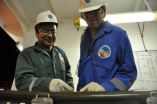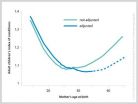(Press-News.org) The study, published today in Cancer Epidemiology, Biomarkers and Prevention is the largest of its kind in Australia and one of the largest in the world. It followed about 4,000 women in a study of the BreastScreen program in Western Australia.
University of Melbourne Research Fellow Dr Carolyn Nickson and colleagues from the Melbourne School of Population Health said the findings reaffirmed the importance and efficacy of mammography.
The study focused on women aged 50-69 years, who are in the target age range for screening. It included 427 cases where women had died from breast cancer and 3,650 control women who were still alive when the other women died.
The research team compared screening attendance between the two groups and found screening was much lower among women who had died from breast cancer, a finding that is consistent with a similar study from South Australia and with numerous studies from around the world. Comparison with similar studies showed an average estimate of a 49% reduced risk of dying.
Some other studies including studies from Australia claim that screening doesn't reduce risk of dying from breast cancer. However, these studies do not compare outcomes for individual women.
"Sound research methods have been used in this study. I believe it is time to move on from the debate about whether screening reduces mortality and to instead direct research resources to help improve the program for women who choose to use it," Dr Nickson said.
"It is important that Australian women have accurate information about the pros and cons of participating in BreastScreen. The findings of this study may help women decide whether to participate."
"Early detection is the key to early treatment and the free BreastScreen program is the best health service available to detect breast cancers earlier in women aged 50-69 years."
### END
Breast cancer screening saves lives, new study shows
2012-09-06
ELSE PRESS RELEASES FROM THIS DATE:
Chikyu sets a new world drilling-depth record of scientific ocean drilling
2012-09-06
Off Hachinohe, Japan—Scientific deep sea drilling vessel Chikyu sets a world new record by drilling down and obtains rock samples from deeper than 2,111 meters below the seafloor off Shimokita Peninsula of Japan in the northwest Pacific Ocean. The Japan Agency for Marine-Earth Science and Technology (JAMSTEC), the implementing organization for scientific expedition aboard the Chikyu, announced this achievement on 6th September, 2012.
Chikyu made this achievement during the Deep Coalbed Biosphere expedition, Expedition 337, conducted within the framework of an international ...
Almost 1 in 5 young children with cancer suffers from a trauma disorder
2012-09-06
People who suffer from posttraumatic stress disorder relive their traumatic experiences in the form of flashbacks and nightmares – and in childhood, also in traumatic plays during which they re-enact the experience over and over again. They avoid stimuli that remind them of the trauma or suffer from vegetative hyperarousal such as insomnia, hypervigilance or concentration problems. For the first time, researchers from the University of Zurich and the University Children's Hospital Zurich now show that infants and toddlers can also develop posttraumatic stress disorder in ...
Joint EACPR and AHA statement empowers health care professional to use Clinical Cardiopulmonary Exercise Testing
2012-09-06
Sophia Antipolis, 6 September 2012: The European Association for Cardiovascular Prevention and Rehabilitation (EACPR), a registered branch of the European Society of Cardiology (ESC), and the American Heart Association (AHA) have today issued a joint scientific statement http://eurheartj.oxfordjournals.org/content/early/2012/08/24/eurheartj.ehs221.short?rss=1 that sets out to produce easy-to-follow guidance on Clinical Cardiopulmonary Exercise (CPX) testing based on current scientific evidence. The document, which has been published simultaneously online in the European ...
Family literacy project exceeds expectations
2012-09-06
A unique approach to early literacy work with families where children develop their language skills and their ability to read and write from an early age has had a huge success.
Researchers from the University of Sheffield funded by the Economic and Social Research Council (ESRC) initially planned to use the approach with around 60 families, but discovered that around 6,000 had actually benefited from their work.
Professor Cathy Nutbrown of the University of Sheffield, who led the project, shared her approach to family literacy with Early Years practitioners including ...
Advanced maternal age not harmful for adult children
2012-09-06
This press release is available in German.
It had been thought that mothers delivering later in life have children that are less healthy as adults, because the body of the mother had already degenerated due to physiological effects like decreasing oocyte quality or a weakened placenta. In fact, what affects the health of the grown-up children is not the age of their mother but her education and the number of years she survives after giving birth and thus spends with her offspring. This is the conclusion of a new study by Mikko Myrskylä from the Max Planck Institute for ...
Multi-functional anti-inflammatory/anti-allergic developed by Hebrew University researcher
2012-09-06
Jerusalem, Sept. 6, 2012 – A synthetic, anti-inflammatory and anti-allergic family of drugs to combat a variety of illnesses while avoiding detrimental side effects has been developed by a Hebrew University of Jerusalem researcher.
The researcher is Saul Yedgar, who is the Walter and Greta Stiel Professor of Heart Studies at the Institute for Medical Research Israel-Canada at the Hebrew University Faculty of Medicine.
Inflammatory/allergic diseases affect billions of people worldwide, and treatments for these conditions are a major focus of the pharmaceutical industry. ...
Earlier treatment for young patients with chronic hepatitis B more effective in clearing virus
2012-09-06
Scientists from A*STAR's Singapore Institute for Clinical Sciences (SICS), together with clinical collaborators from London , discovered for the first time that children and young patients with chronic Hepatitis B Virus infection (HBV carriers) do have a protective immune response, contrary to current belief, and hence can be more suitable treatment candidates than previously considered.
This discovery by the team of scientists led by Professor Antonio Bertoletti, programme director and research director of the infection and immunity programme at SICS, could lead to ...
Mars's dramatic climate variations are driven by the Sun
2012-09-06
On Mars's poles there are ice caps of ice and dust with layers that reflect to past climate variations on Mars. Researchers from the Niels Bohr Institute have related the layers in the ice cap on Mars's north pole to variations in solar insolation on Mars, thus established the first dated climate history for Mars, where ice and dust accumulation has been driven by variations in insolation. The results are published in the scientific journal, Icarus.
The ice caps on Mars's poles are kilometres thick and composed of ice and dust. There are layers in the ice caps, which ...
A brain filter for clear information transmission
2012-09-06
This press release is available in German. Stefan Remy and colleagues at the German Center for Neurodegenerative Diseases (DZNE) and the University of Bonn have illuminated how this system works. "The system acts like a filter, only letting the most important impulses pass," explains Remy. "This produces the targeted neuronal patterns that are indispensible for long-term memory storage."
How does this refined control system work? How can inhibitory signals produce precise output signals? This was the question investigated by Remy and his colleagues. Scientists have known ...
Human genome far more active than thought
2012-09-06
The GENCODE Consortium expects the human genome has twice as many genes than previously thought, many of which might have a role in cellular control and could be important in human disease. This remarkable discovery comes from the GENCODE Consortium, which has done a painstaking and skilled review of available data on gene activity.
Among their discoveries, the team describe more than 10,000 novel genes, identify genes that have 'died' and others that are being resurrected. The GENCODE Consortium reference gene catalogue has been one of the underpinnings of the larger ...



